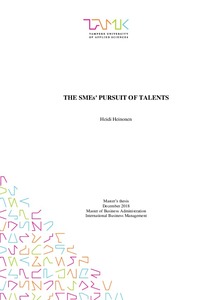The SMEs’ pursuit of talents
Heinonen, Heidi (2018)
Heinonen, Heidi
Tampereen ammattikorkeakoulu
2018
All rights reserved
Julkaisun pysyvä osoite on
https://urn.fi/URN:NBN:fi:amk-2018112918956
https://urn.fi/URN:NBN:fi:amk-2018112918956
Tiivistelmä
SMEs are the answer for creating new jobs, for as they grow, they need to increase the number of talents at the company at a fast pace. This effect has a positive impact in the economy and results in higher employment rates in Finland and all over the world. Merus Power as the commissioning company of this thesis felt that attracting talents was a crucial issue for them as an SME, at the point of fast growth. The purpose was to find out how an SME can attract talents, and why talents choose to apply and start working for them.
This thesis began with a theoretical framework, which introduced the topics related to human resource management, recruitment, the state of working life which affects the overall atmosphere where companies and employees operate, and finally motivation which is the foundation which guides people in the choices they make. The research data was collected with a mixed methods questionnaire and distributed on social media. The results were analyzed with an inductive method, and the theoretical framework provided the context for the analysis and recommendations.
The main results and outcome of this thesis are the answers to the research questions, and the recommendations for Merus Power. Employee wellbeing is the foundation of an employer brand, and one piece of a puzzle in the employer brand cycle. The recommendations therefore aim to improve Merus Power’s employer brand and to make it more attractive to possible applicants. Eventually, the goal is that when applicants are offered a position, they feel they want to work at Merus Power, thus choosing to work at an SME.
This thesis began with a theoretical framework, which introduced the topics related to human resource management, recruitment, the state of working life which affects the overall atmosphere where companies and employees operate, and finally motivation which is the foundation which guides people in the choices they make. The research data was collected with a mixed methods questionnaire and distributed on social media. The results were analyzed with an inductive method, and the theoretical framework provided the context for the analysis and recommendations.
The main results and outcome of this thesis are the answers to the research questions, and the recommendations for Merus Power. Employee wellbeing is the foundation of an employer brand, and one piece of a puzzle in the employer brand cycle. The recommendations therefore aim to improve Merus Power’s employer brand and to make it more attractive to possible applicants. Eventually, the goal is that when applicants are offered a position, they feel they want to work at Merus Power, thus choosing to work at an SME.
